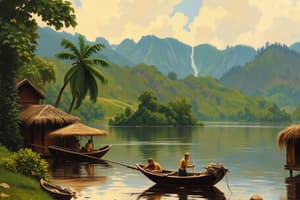Podcast
Questions and Answers
What is one reason for Guatemala's high biological diversity?
What is one reason for Guatemala's high biological diversity?
- The absence of endemic species.
- The presence of only tropical rainforests.
- Its geographical location and variety of ecosystems. (correct)
- The dominance of urban areas over natural habitats.
Which ecosystems are specified as important for the migration of birds?
Which ecosystems are specified as important for the migration of birds?
- Mountains.
- Tropical forests.
- Deserts.
- Wetlands and marshes. (correct)
Which of the following species is considered endangered and represents Guatemalan wildlife?
Which of the following species is considered endangered and represents Guatemalan wildlife?
- Jaguars. (correct)
- Red-eyed tree frog.
- Mountain lion.
- Tapir.
What is one major threat to biodiversity in Guatemala?
What is one major threat to biodiversity in Guatemala?
What efforts are made to conserve biodiversity in Guatemala?
What efforts are made to conserve biodiversity in Guatemala?
Which notable species is recognized as a national symbol of freedom in Guatemala?
Which notable species is recognized as a national symbol of freedom in Guatemala?
How do local universities contribute to biodiversity in Guatemala?
How do local universities contribute to biodiversity in Guatemala?
Why is biodiversity important to indigenous cultures in Guatemala?
Why is biodiversity important to indigenous cultures in Guatemala?
Study Notes
Biología en Guatemala
Diversidad Biológica
- Guatemala posee una gran diversidad biológica debido a su ubicación geográfica y variedad de ecosistemas.
- Se identifican más de 17,000 especies de plantas, 700 especies de aves y 200 especies de mamíferos.
- Más de 4,000 especies de plantas son endémicas.
Ecosistemas Principales
- Bosques Tropicales
- Albergan una rica fauna y flora, incluyendo especies en peligro de extinción como el jaguar y el quetzal.
- Montañas
- Refugio de diversas especies de orquídeas y fauna adaptada a altitudes elevadas.
- Mareas y Humedales
- Importantes para la migración de aves y la biodiversidad acuática.
Amenazas a la Biodiversidad
- Deforestación: Pérdida de hábitats naturales por la agricultura y la urbanización.
- Cambio Climático: Afecta los patrones de lluvia y temperaturas, impactando ecosistemas.
- Contaminación: Impacto en cuerpos de agua y su biodiversidad.
Conservación
- Existen diversas áreas protegidas y reservas naturales que buscan preservar la fauna y flora guatemalteca.
- Programas de educación y sensibilización sobre la importancia de la biodiversidad.
- Colaboración con organizaciones no gubernamentales para la investigación y conservación.
Especies Notables
- Quetzal (Pharomachrus mocinno): Ave nacional, símbolo de libertad.
- Tigre de dientes de sable (Smilodon): Extinto, pero importante en la historia de la fauna prehistórica.
- Rana de la lluvia (Lithobates forreri): Especie amenazada, representativa de ecosistemas acuáticos.
Investigación y Estudios
- Universidades y centros de investigación en Guatemala realizan estudios sobre la biodiversidad y conservación.
- Proyectos de investigación en biología molecular y ecología para entender mejor los ecosistemas locales.
Importancia Cultural
- La biodiversidad tiene un papel esencial en la cultura indígena, incluyendo prácticas medicinales y rituales.
- La flora y fauna son reflejo de la identidad cultural y espiritual de varios pueblos indígenas.
Biological Diversity
- Guatemala boasts a remarkable biological diversity due to its geographic location and varied ecosystems.
- Over 17,000 plant species, 700 bird species, and 200 mammal species have been identified in the country.
- More than 4,000 plant species are endemic, meaning they are found nowhere else on Earth.
Main Ecosystems
- Tropical Forests: Home to rich fauna and flora, including endangered species like the jaguar and the quetzal.
- Mountains: Provide refuge for a variety of orchid species and fauna adapted to high altitudes.
- Estuaries and Wetlands: Crucial for bird migration and aquatic biodiversity, supporting numerous species.
Threats to Biodiversity
- Deforestation: Results in the loss of natural habitats due to agricultural expansion and urban development.
- Climate Change: Alters rainfall patterns and temperatures, adversely affecting ecosystems.
- Pollution: Harms water bodies and degrades aquatic biodiversity.
Conservation Efforts
- Several protected areas and nature reserves exist to safeguard Guatemala's unique fauna and flora.
- Educational programs aim to raise awareness about the importance of biodiversity conservation.
- Collaborations with non-governmental organizations focus on research and conservation initiatives.
Notable Species
- Quetzal (Pharomachrus mocinno): National bird and symbol of freedom in Guatemala.
- Saber-toothed Tiger (Smilodon): Extinct species that plays a significant role in the history of prehistoric fauna.
- Rain Frog (Lithobates forreri): An endangered species representative of aquatic ecosystems.
Research and Studies
- Universities and research centers in Guatemala conduct studies centered on biodiversity and conservation strategies.
- Projects on molecular biology and ecology enhance understanding of local ecosystems.
Cultural Significance
- Biodiversity plays an essential role in indigenous cultures, influencing medicinal practices and rituals.
- Flora and fauna reflect the cultural identity and spiritual beliefs of various indigenous communities.
Studying That Suits You
Use AI to generate personalized quizzes and flashcards to suit your learning preferences.
Description
Explore the rich biodiversity of Guatemala, including over 17,000 plant species and 700 bird species. Learn about the unique ecosystems such as tropical forests and mountains, which host endangered species like the jaguar and quetzal.




